Jeb Bush = Tiger Woods
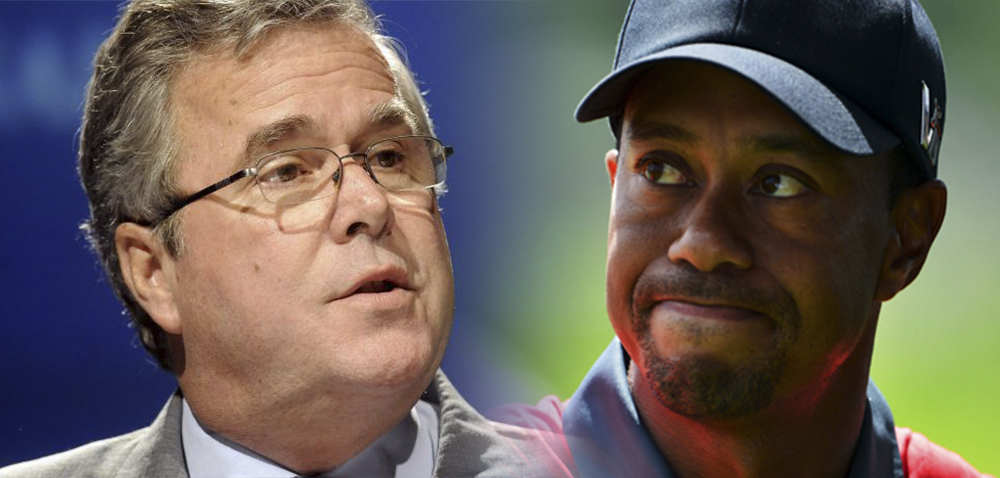
For the past several weeks, the mainstream press has reveled in pummeling the soft underbelly of Jeb Bush‘s non-campaign. From a bad week on the trail when Jeb couldn’t provide a cogent response to the Iraq war question to a host of new occupants pushing their way into the Republican presidential clown car to an alleged “shake-up” on his staff that involved, let’s see, giving a guy from Iowa a different title in his nascent organization, the press has been relentless in painting Jeb as a hapless rube riding the bad side of the Darwinian curve. And yet, despite the foreshadowing of his demise, Bush has been consistently, and sometimes even powerfully, moving the ball down the field. In the past two weeks, he has managed to pull off what no other Republican candidate has accomplished: a trip to Europe where he effortlessly projected the competence of a seasoned American statesman. Bush received solid reviews for his deft handling of foreign policy and his ability to build diplomatic bonds. By contrast, when Chris Christie recently visited the United Kingdom — usually a layup for an American politician — he managed to turn it into a political disaster. Eventually, Christie even refused to take questions from reporters. Scott Walker did little better while in Europe, comparing Wisconsin union protesters to ISIS and lamely concluding that he wouldn’t answer questions about foreign policy on foreign soil. And then there was this week’s official announcement. Bush’s organization shrewdly packed a college gymnasium with thousands of rabid Jebophiles, many of whom were Latinos armed with Jeb-logoed thundersticks. (Contrast this to the 800 or so people who showed up for the Marco Rubio announcement.) The excitement and enthusiasm were palpable, and what we saw was perhaps the first glimpse ever of how a dominant and resurgent Republican Party could look in the decade ahead. One sensed that if Jeb Bush is elected president that historians will look back on that frenzied rally as a pivotal moment in the evolution of the Grand Old Party, and at center stage was the man who dared to reimagine the party in a new and compellingly inclusive way. Bush’s announcement was shockingly different than any other presidential announcement (almost ever), and Jeb looked perfectly comfortable in the frenetic and diverse environment. Now the announcement tour rolls on with Jeb popping up in the usual (Sean Hannity) and less expected (Jimmy Fallon) venues. He seems to be in full command of his capacities, taking all questions and fulfilling his promise to “joyfully” campaign. This week the “White Lebron” will swing through the early primary states, shaking thousands of hands and selling himself at the retail level. It’s actually not Lebron whom Bush should be compared, but Tiger Woods. No, not the current Tiger Woods who recently missed the cut at the Quicken Loans National, but Tiger Woods circa 1999-2007 (which coincidentally overlaps with Bush’s time in office). For much of Woods storied golfing career, one of the bets offered was him vs. The Field, meaning you could wager either on Tiger winning or all of the other golfers playing in a tournament. That almost seems preposterous until you realize that going into most events The Field was only a slight favorite (a dollar bet would only earn you 50 cents, while a dollar bet on Woods would earn you a buck twenty). Of course, the smart money would week in and week out bet on The Field, but it would not feel good about doing so because there was so much potential on the other side of the proposition. The same can be said about the race for the GOP presidential nomination. With Rubio, Walker, John Kasich, and so many other talented golfers, err, candidates in the field, the smart money would probably take The Field versus Bush. Maybe. PredictIt, an online political stock market that uses the marketplace to forecast events, currently has a share of stock in Bush winning the GOP nomination at 42 cents (were Bush to actually win, that share would pay out at a dollar). That feels about right. It’s still safer to take the rest of The Field, but not by much. That’s how it was each weekend Tiger Woods played in a golf tournament. And that’s how the presidential race is shaping up in the early stages. Meanwhile, Jeb is fully on the comeback trail, although pitfalls may lay ahead. For starters, the pundit-fueled descriptions of his earlier missteps were overblown. There’s not really a systemic failure from which he needs to come back. But, the data points over the last few weeks point in a strongly positive direction. What we are seeing is Jeb unchained, a more seasoned and liberated version of the guy we remember as our very successful governor, now free to act like a real candidate and clearly comfortable in his own skin. This is the Jeb who, if he continues to take risks and amass a mountain of campaign contributions, can become our next president.
Scott Walker’s record as governor takes hits this year
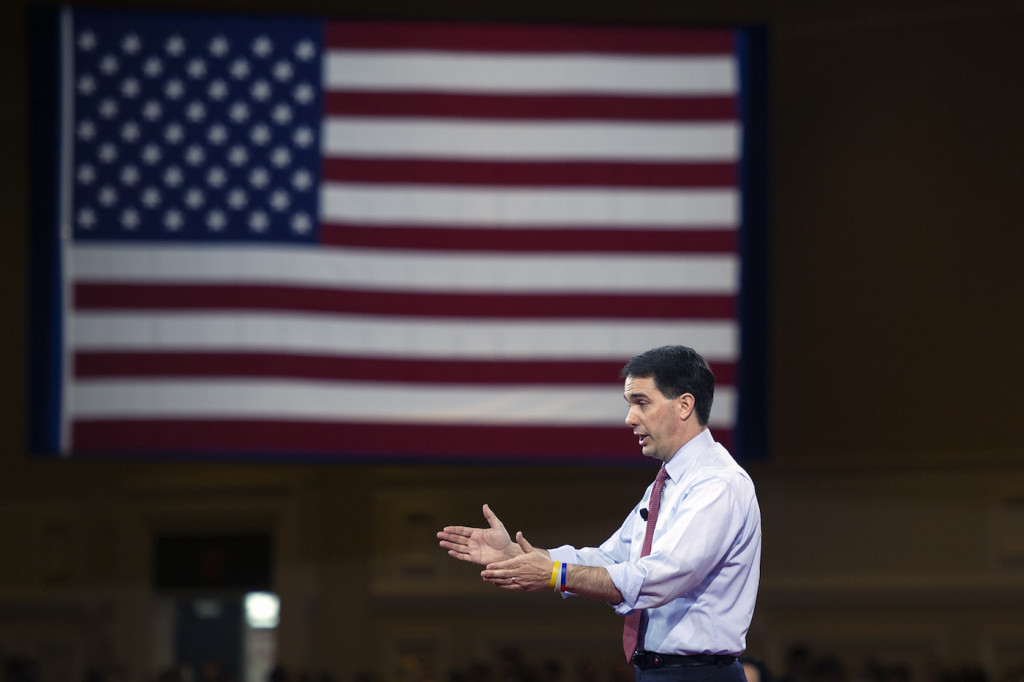
While Scott Walker‘s fellow Republicans groused about his budget plan and part of his proposal to overhaul higher education, the governor was more than 1,000 miles away, gripping the wheel of the Mt. Washington cruise boat on New Hampshire’s Lake Winnipesaukee. When lawmakers met Monday night to reach a final deal on other elements of that budget, the likely presidential candidate was in Canada on his fourth international trip in less than five months. Absentee governors are part of the political landscape when a presidential campaign begins and some want to run. There’s no getting around the need to raise money, make national appearances and organize early in important states. What may distinguish Walker, though, is the grief he’s getting from his own party. One GOP lawmaker has dissed his spending plan as a “crap budget,” and it gets worse than merely a rhetorical slap. While Walker has been courting voters, party activists and donors in advance of his expected announcement that he’s running for the 2016 party nomination, state GOP lawmakers, in concert with Democrats, have crushed some of his biggest ideas this year. That works against one clear advantage governors such as Walker can take to national politics: a record of achievement in public policy that many candidates coming from the Byzantine, often gridlocked chambers of Congress can’t match. Walker played into that theme this past week in addressing a Utah retreat held by 2012 nominee Mitt Romney. Walker said flatly of senators in the presidential race: “They have yet to win anything and accomplish anything.” That was a dig at Sens. Marco Rubio of Florida, Ted Cruz of Texas and Lindsey Graham of South Carolina. In Wisconsin, however, lawmakers voted to restore money the governor wanted to cut for K-12 schools. They rejected his proposed changes to a popular prescription drug program for Medicaid recipients, scrapped a merger of state agencies he wanted, and voted against the governor’s plan to make the University of Wisconsin system independent of state laws and oversight. Walker has benefited from a state Senate and Assembly controlled by Republicans his entire four-plus years as governor. When he won re-election in November, he predicted that decisive action on his budget by the enlarged Republican majorities in the Legislature would serve as a contrast to a dysfunctional Washington. “We’re going to be even more aggressive now because I think we have an even stronger ally in the Legislature,” Walker told the Cabinet. Now it’s a struggle to find agreement on Walker’s proposed $1.3 billion in borrowing for roads, likely to be reduced, and a financing plan for a new $500 million arena to keep the Milwaukee Bucks from leaving the state. “We may have a crap budget, but we’re going to make it better,” freshman Republican state Rep. Rob Brooks told fellow lawmakers in May. Walker says he’s as engaged as ever on the budget, and talks with his chief of staff more than a dozen times a day, no matter where he is. “The budget is a priority for us,” Walker said this month. But it’s clear he will not get as much as he proposed back in February, or have it done faster than usual. None of this has stopped Walker from making the rounds in early voting states such as Iowa, South Carolina and New Hampshire. In late May, he courted party activists aboard a sunset dinner cruise as a legislative committee back home rejected his plan to give the University of Wisconsin more independence or cut state support for it by $300 million. But the panel did agree on $250 million in cuts to the 26 campuses, including the flagship in Madison. “We are bowing to the pressure of a guy on a boat in New Hampshire,” Democratic state Sen. Jon Erpenbach said during that debate. “He’s not out there extolling the virtues of his idea of cutting $300 million from the university system because he’d probably be thrown off the boat. You don’t brag about the cuts.” The committee also kept Walker’s call to remove tenure protections from state law, a proposal that’s garnering attention nationally from academics who fear weakening tenure protections will catch on elsewhere. Even with delays and squabbling, Walker is likely to walk away with some big wins: on lifting an enrollment cap on statewide private school vouchers, on new drug screening for public aid recipients and on lower property taxes. Those are all sure-fire crowd-pleasers on the Republican presidential circuit. At least in Walker’s view, he’s getting enough done so that he could tell his lake cruisers: “If we can do it in a blue state like Wisconsin, we can do it in the Granite State and all across America.” Republished with permission of The Associated Press.
Jeb Bush has optimistic message, faces challenges in ’16 bid
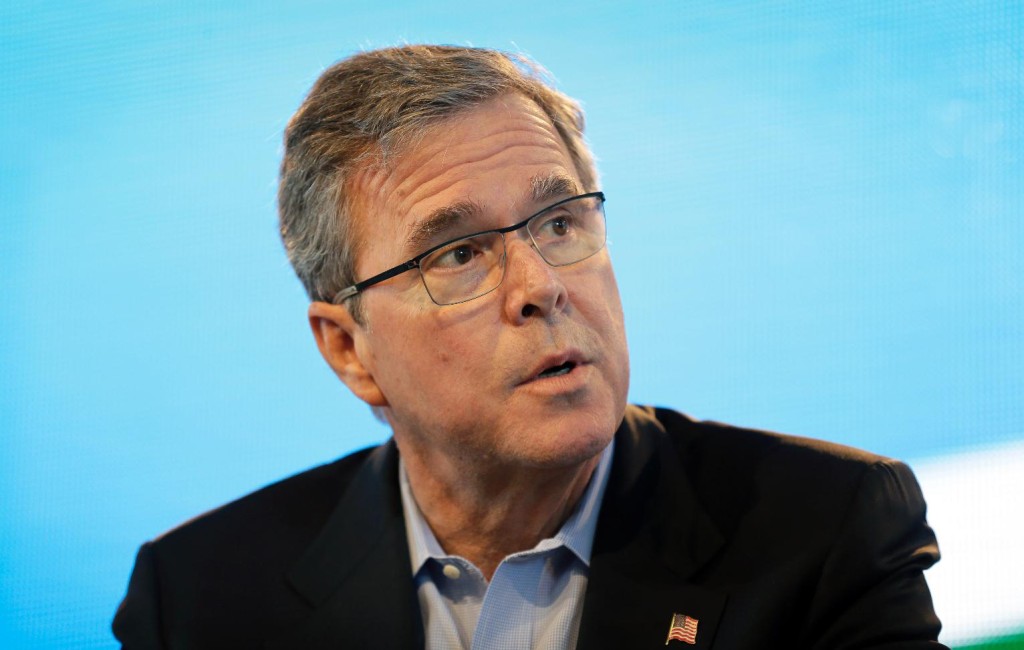
Jeb Bush launched a Republican presidential bid months in the making Monday with a vow to get Washington “out of the business of causing problems” and to stay true to his beliefs: easier said than done in a bristling primary contest where his conservative credentials will be sharply challenged. “I will campaign as I would serve, going everywhere, speaking to everyone, keeping my word, facing the issues without flinching,” Bush said, opening his campaign at a rally near his south Florida home at Miami Dade College, where the institution’s large and diverse student body symbolizes the nation he seeks to lead. The former Florida governor, whose wife is Mexican-born, addressed the packed college arena in English and Spanish, an unusual twist for a political speech aimed at a national audience. “In any language,” Bush said, “my message will be an optimistic one because I am certain that we can make the decades just ahead in America the greatest time ever to be alive in this world.” Bush enters a 2016 Republican contest that will test both his vision of conservatism and his ability to distance himself from family. Neither his father, former President George H.W. Bush, nor his brother, former President George W. Bush, attended Monday’s announcement. The family was represented instead by Jeb Bush’s mother and former first lady, Barbara Bush, who once said that the country didn’t need yet another Bush as president, and by his son George P. Bush, recently elected Texas land commissioner. Before the event, the Bush campaign came out with a new logo, Jeb!, that conspicuously leaves out the Bush surname. And in his speech, he took on critics in both parties, particularly Hillary Rodham Clinton, the overwhelming favorite in the race for the Democratic presidential nomination. “The party now in the White House is planning a no-suspense primary, for a no-change election,” Bush said. “The presidency should not be passed on from one liberal to the next.” He later called out Clinton by name, and indirectly jabbed fellow Republicans, including his political protegé Florida Sen. Marco Rubio, who welcomed Bush into the 2016 contest earlier in the day. “We are not going to clean up the mess in Washington by electing the people who either helped create it or have proven incapable of fixing it,” Bush said. Bush joins the race in progress in some ways in a commanding position, in part because of his family connections. He has probably raised a record amount of money to support his candidacy and conceived of a new approach on how to structure his campaign, both aimed at allowing him to make a deep run into the GOP primaries. But on other measures, early public opinion polls among them, he has yet to break out. While unquestionably one of the top-tier candidates in the GOP race, he is also only one of several in a large and capable Republican field that does not have a true front-runner. In the past six months, Bush has made clear he will remain committed to his core beliefs in the campaign to come, even if his positions on immigration and education standards are deeply unpopular among the conservative base of the party that plays an outsized role in the GOP primaries. Tea Party leader Mark Meckler on Monday said Bush’s positions on education and immigration are “a nonstarter with many conservatives.” “There are two political dynasties eyeing 2016,” said Meckler, a co-founder of the Tea Party Patriots, one of the movement’s largest organizations, and now leader of Citizens for Self-Governance. “And before conservatives try to beat Hillary, they first need to beat Bush.” Yet a defiant Bush has showed little willingness to placate his party’s right wing. Instead, he aimed his message on Monday at the broader swath of the electorate that will ultimately decide the November 2016 general election. Minority voters, in particular, have fueled Democratic victories in the past two presidential elections. Of the five people on the speaking program before Bush, just one was a white male. Bush is one of 11 major Republicans in the hunt for the nomination. Wisconsin Gov. Scott Walker and Ohio Gov. John Kasich are among those still deciding whether to join a field that could end up just shy of 20. Bush’s critics in both parties have criticized him as aggressively as they would if he were the clear Republican favorite. Kentucky Sen. Rand Paul said Monday there’s “Bush-Clinton fatigue” in America. “I think some people have had enough Bushes and enough Clintons,” Paul said in an interview with The Associated Press. After touring four early-voting states, Bush quickly launches a private fundraising tour with stops in at least 11 cities before the end of the month. Two events alone, a reception at Union Station in Washington on Friday and a breakfast the following week on Seventh Avenue in New York, will account for almost $2 million in new campaign cash, according to invitations that list more than 75 already committed donors. Republished with permission of The Associated Press.
Jeb Bush still with much to prove in leaderless GOP 2016 race
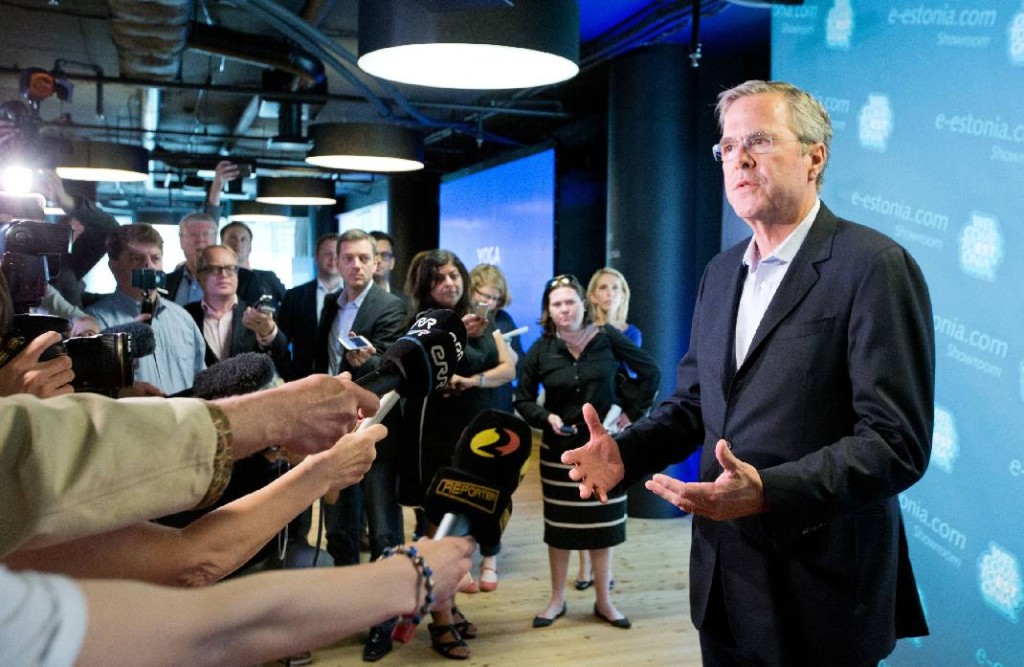
When Jeb Bush finally says on Monday that he’s running for president, he’ll begin the campaign with much to prove. Back in December, the former Florida governor said he was exploring a 2016 run, an announcement that by itself had the power to kick off the campaign. In the six months since, Bush probably has shattered a fundraising record as well as pioneering a new approach to White House campaigning. He has just completed a well-reviewed trip through Europe. Supporters had hoped that this son of one president and brother of another would by now hold a commanding position in an unwieldy Republican field. Yet he has not broken away from the pack. “I know that I’m going to have to go earn this,” Bush said this past week. “It’s a lot of work and I’m excited about the prospects of this. It’s a long haul. You start wherever you start, and you end a long way away from where we are today, so I just urge everybody to be a little more patient about this.” Bush, 62, planned to make his candidacy official during a Monday afternoon speech and rally at Miami Dade College, the nation’s largest university. He has failed to scare any potential rival from the race, except perhaps 2012 nominee Mitt Romney. He is unpopular among some of his party’s most passionate voters and little known beyond his home state despite the Bush name. “I thought Jeb would take up all the oxygen,” said Ohio Gov. John Kasich. “He hasn’t.” Emboldened by Bush’s slow rise, Kasich acknowledged this weekend that he is stepping up preparations for a possible campaign. Bush is one of 11 major Republicans in the hunt for the nomination. Kasich and a few others are still deciding whether to join a field that could end up just shy of 20. But few among them entered the race with such a high expectations of success as did Bush. Those expectations have seemed a burden at times. Take, for example, the question of whether Bush will report raising $100 million for his campaign in the first six months of the year. Lost amid the “will he or won’t he” is that Bush probably will have taken in far more than anyone else. Romney said Saturday it would not surprise him to learn that Bush had scooped up twice that of all the other GOP candidates combined. “By all appearances, he’s raised a lot of money,” Romney said, praising Bush’s “experienced and capable team.” ”At this stage, that’s a very important thing to do.” Even if he does not reach the $100 million mark, Bush will have amassed more in six months than Romney and his allies at a super political action committee raised for the entire year before the 2012 election. By contrast, a senior adviser to Wisconsin Gov. Scott Walker, considered along with Bush among the few top-tier 2016 contenders, expects he will raise roughly $25 million through the end of June. The adviser spoke on the condition of anonymity to share internal fundraising details. Romney’s former fundraising chief, Spencer Zwick, said despite Bush likely commanding lead in the fundraising race, it’s not clear how much of an advantage he will hold over the field. “You don’t need $100 million to run a primary,” Zwick said. He suggested that multiple candidates would have the resources “to go the distance,” adding that “it doesn’t feel like anybody owns the dominant position.” Bush took lots of questions this past week about a supposed shake-up at campaign headquarters, even though only one member of his senior team — who remains on Bush’s staff — was affected. The attention exasperated Bush: “It’s June, for crying out loud,” he told reporters while in Berlin. “We’ve got a long way to go.” Still, Bush’s first six months back in politics since leaving the governor’s office in 2007 have been underwhelming at times. His low-key speaking style often leaves something to be desired, particularly when compared with some opponents. He sometimes gets snippy during long campaign days. While detailed policy questions are often his strength, he struggled for several days last month to answer a predictable question about the war in Iraq that his brother, former President George W. Bush, waged. “He would be an excellent president no doubt, but how far he can go in the process remains to be seen,” said John Rakolta Jr., the CEO of a Michigan construction company and a leading Romney donor. In his speech Monday, Bush planned to make the case that those involved in creating Washington’s problems cannot fix them. The point is designed to jab the Republican senators — including political protégé in Florida, Marco Rubio — in the race. Meanwhile, an allied super PAC fueled by Bush’s fundraising haul is developing an advertising strategy that will promote Bush’s record in Florida and attack his rivals. Illinois-based businessman Todd Ricketts, a Walker supporter, said it’s far too early to draw any conclusions about Bush or the rest of the field. “Once there’s a debate, we’ll have a clearer picture of who appears to be ready,” he said. Republished with permission of the Associated Press.
Scott Walker pushes to strip university tenure in Wisconsin as he girds for presidential run
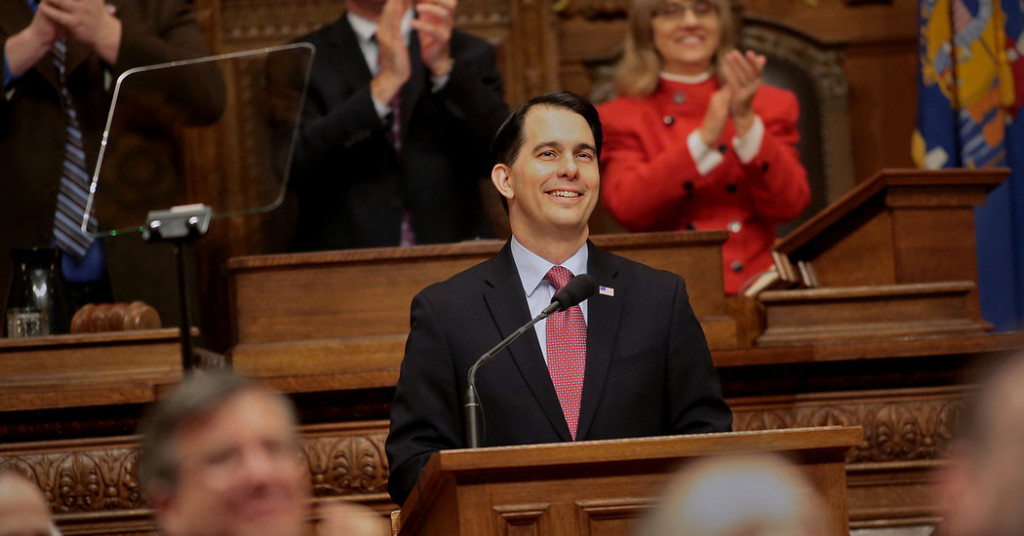
Four years after taking union rights away from teachers and other public workers in Wisconsin, Gov. Scott Walker now wants to strip job protections for University of Wisconsin professors in a move he likens to the 2011 law that made him a national figure and set up his expected presidential run. Eliminating tenure in state law, as Walker proposed in January and a Republican-controlled legislative committee approved this month, is part of a larger overhaul of higher education policy that he is talking about to Republican voters across the country. Walker and Republican backers defend his higher education proposal as empowering university leaders to be more like a business and nimble in how they govern. University professors and their supporters, both in Wisconsin and nationally, are raising alarms that it’s an attack on academic freedom that could gain momentum in other states. “Within the higher ed universe, this is being seen as an extremely consequential, signal event,” said Barmak Nassirian, director of federal relations and policy analysis at the American Association of State Colleges and Universities. A companion effort would take from professors and staff certain decision-making powers about campus issues including curriculum, research and faculty status. Combined with ending tenure in state law, the higher education proposal would be the first of its kind in the country, Nassirian said. “Obviously the faculty are opposed, but there are plenty of folks who look at it and believe this, in fact, is the future,” Nassirian said, citing the increasing pressure on universities to be more efficient in light of escalating tuition costs. “And it may be.” Wisconsin faculty members are sounding alarms that the changes will lead to a flood of departures for universities with stronger tenure. A petition signed by more than 450 of the university’s award-winning researchers asked lawmakers to reconsider. More than a dozen faculty members came to a Board of Regents meeting with tape over their mouths, holding signs of protest. That’s a far cry from the 2011 protests at the state Capitol that grew to as many as 100,000 people when Walker went after public workers’ union protections. Still, Walker openly makes comparisons. This is “Act 10 for the university,” he says, invoking the title of the union law. Opponents say protests could grow, and extend beyond Wisconsin. Henry Reichman, vice president of the American Association of University Professors and chairman of its committee on academic freedom and tenure, said the proposed changes in Wisconsin could embolden faculty both there and throughout the country to become more organized as Walker mounts his expected run for the Republican nomination. “One message to higher ed would be you really don’t want to support Scott Walker for president because if he can do it in Wisconsin, he will do it everywhere,” Reichman said. Walker, who attended Marquette University but did not graduate, initially proposed cutting the university’s state aid by 13 percent, or $300 million. Budget writers in the Legislature have reduced the proposed cut to $250 million, while still voting to eliminate tenure in state law, leaving it up to the university’s regents to set a policy as is done in every other state. But the Legislature’s budget committee went even further, proposing to change the law to make it easier to fire those with tenure. Now, tenured faculty members can only be fired for just cause or if there’s a financial emergency. Under the new provisions, the administration could fire them “when such an action is deemed necessary due to a budget or program decision requiring program discontinuance, curtailment, modification or redirection.” The Legislature is expected to vote on the proposals this month or next, when passing a state budget. Walker has been campaigning for the GOP nomination for months, in all but name, but says he won’t announce his decision until the budget is passed. In taking tenure out of state law, the legislation would let the Board of Regents set its own policy on that matter. But with 16 of the 18 regents appointed by the governor, taken together with the broader authority under state law to fire faculty, opponents of the move say the resulting policy is bound to be feckless. “Tenure will be gone as we know it and I think it’s a step backward for our relationship with faculty members,” said Tony Evers, who is on the Board of Regents in his capacity as state superintendent. Evers fought against Walker’s union restrictions against teachers and other public workers four years ago and signed the petition that led to the 2012 statewide vote over recalling Walker from office. Walker won that vote. Republished with permission of The Associated Press.
Chris Christie betting 2016 presidential hopes on town halls to connect with voters
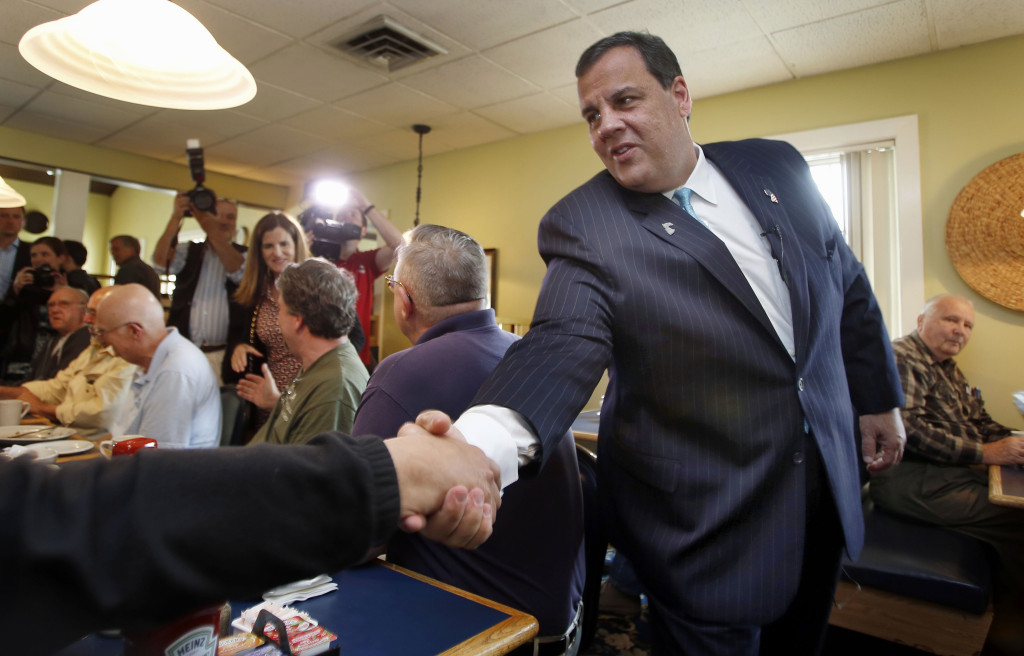
If Chris Christie runs for president, there’s little doubt people will see plenty of the town halls the New Jersey governor is known for. That anything-goes format is his comfort zone, and voters tend to like it. Christie spent hours answering questions at two town hall-style events during the past week in South Carolina: one planned, the other an impromptu session in the back room of a bar. He’ll be doing the same in Iowa in the days ahead. Such get-togethers “are something that I’ve been doing for a long time in New Jersey,” Christie told the crowd at Tommy’s Country Ham House in Greenville. To be precise, he’s done 138 such events, most in New Jersey. He said he will do many more. Christie’s aptitude for answering questions on the fly pleases his audiences and fits well in states such as New Hampshire where voters expect close-up interaction, repeatedly, from presidential candidates. But that tradition is less robust in South Carolina and elsewhere, where advertising and organization count for more. Christie says he will decide this month whether to run for the 2016 Republican nomination. “Just walking into a space and holding a town hall is not something we typically have,” said Leighton Lord, a college friend of Christie who lives in South Carolina and has been acting as his liaison. “He’s much, much more likable when people see him in person than the way he’s portrayed nationally.” Gloria Roberts, among the more than 200 people at the ham house, called Christie “extremely impressive and I believe he does what he says.” Roberts, 69, a retired software company who lives in nearly Piedmont, said she was “totally going in another direction” before she heard Christie speak. Texas Sen. Ted Cruz had topped her list of 2016 favorites. Ninety minutes later, that had changed. Christie “makes you feel like you can believe in the government,” she said. “He makes you feel strong and safe.” Some remained skeptical. Gary Abbe, 61, a chiropractor who describes himself as a fiscal and social conservative, praised Christie for his honesty and for taking unfiltered questions. “Doesn’t mean he’s in my top five,” said Abbe, who prefers Cruz, Wisconsin Gov. Scott Walker and retired neurosurgeon Ben Carson. South Carolina has changed in recent decades, with an influx of voters from states such as Ohio and New Jersey, especially along the state’s coast, GOP officials say. Plus, there’s a large military presence. “A lot of folks feel like South Carolina is strictly the social conservative vote and that’s really not the case,” said Eaddy Willard, chairman of the Richland County Republicans. He hosted Christie’s meet-and-greet event at the Liberty Tap Room, which turned into a freewheeling 90-minute session. Christie apparently lost track of time. He wound up late for a private meeting with Gov. Nikki Haley and another event. GOP consultant Chip Felkel, who worked for George W. Bush and George H.W. Bush, said Christie lags behind GOP rivals in setting up an operation in South Carolina and may “have trouble finding a lane here.” “I wouldn’t say he’s been forgotten, but he hasn’t been getting a lot of consideration of late,” Felkel said. “He kind of flashed in and flashed out.” But Robert Cahaly, a political consultant who also is unaffiliated, said Christie might find himself in the top three or four in South Carolina if he spends enough time and money. “He is a household name and his style is an immediate contrast to politics and politicians as usual,” he said. “And in any group this big, it’s about standing out, it’s about zigging when everyone zags. And this guy’s more capable of that than anyone I’ve ever seen.” Republished with permission of The Associated Press.
Jeb Bush joins unwieldy race as new phase of GOP campaign begins

Jeb Bush stepped into the Republican race for president on Thursday, finally taking his place — after months of hints and relentless fundraising — amid an unwieldy field of GOP candidates unlike any in recent memory. The son of one president and brother of another, the former Florida governor has the rank of front-runner and the donors to match. He now has eight months before the first votes are cast in the Iowa caucuses to prove he’s worthy of both. “It’s as wide-open a race as we’ve seen in a long time,” said Republican strategist Kevin Madden, who described Bush as the “technical front-runner” in a field that stands at 11 major declared candidates. Among them: former Texas Gov. Rick Perry, who returned Thursday to presidential politics four years after his 2012 presidential bid ended in disaster, vowing during his own campaign kickoff to “end an era of failed leadership.” While both men were widely expected to enter the race, which got its unofficial start when Bush said in December he was exploring whether to seek the Republican nomination, the confirmation from aides that Bush will indeed run is nonetheless a defining moment for the GOP. The son of George H.W. Bush and younger brother of George W. Bush, he is a favorite of the Republican establishment, the experienced and well-connected party faithful who have showered the 62-year-old with money, staffing talent and encouragement in recent months. His decision ensures the possibility of a general election showdown between two political dynasties as Hillary Rodham Clinton seeks the Democratic nomination. Senior aides confirmed that Bush, who left the Florida governor’s mansion in 2007, will enter the race June 15 during an event at Miami Dade College. They spoke on condition of anonymity so as not to take the edge off his formal announcement. “I want to be the guy to beat,” a confident Bush said while campaigning in Florida earlier this week. The GOP contest now features candidates of different generations, races and genders, whose policy prescriptions are far from monolithic and whose personalities often clash. There are more to come: four sitting governors — Wisconsin’s Scott Walker and New Jersey’s Chris Christie, among them — are likely to join the race before the GOP’s first presidential debate in August. “Everyone is bunched together in the polls, and no one candidate in particular has emerged as a clear leader in the early state contests,” Madden said. Perry opened his campaign in a fight for relevancy among the many Republicans trying to knock Bush from his front-runner position. Despite his record as Texas’ longest-serving governor, Perry may struggle to reach the polling threshold that will decide the 10 candidates who will take part in the party’s first debate on Aug. 6. He announced his candidacy in a humid airport hangar alongside a C-130 cargo plane, like one he flew for the Air Force, and wasted little time in trying to distinguish himself from the swarm of Republican contenders not named Bush. “Leadership is not a speech on the Senate floor,” he declared in an apparent swipe at the four Republican senators in the race: Marco Rubio of Florida, Rand Paul of Florida, Ted Cruz of Texas and Lindsey Graham of South Carolina. “It’s not what you say. It’s what you do.” Madden, who previously worked for Mitt Romney, predicted that Bush’s entry would prompt “more obvious head-to-head engagements among the candidates” as they jockey for position. Eight current and former governors could ultimately be in the race, along with five current and former senators, a former neurosurgeon and two business executives. The only woman in the Republican field, Carly Fiorina, has never held elected office, yet the former technology executive appears to be gaining momentum as she campaigns across early voting states including New Hampshire and South Carolina. There are two Hispanic candidates — Cruz and Rubio — while Bush is married to a Mexican native and speaks fluent Spanish. Perhaps more than any of his rivals, Bush has refused so far to bend to his party’s conservative base, sticking to unpopular positions on illegal immigration and education testing standards. And he regularly proclaims loyalty and love for his brother, George W. Bush, whom he lists as a trusted adviser. “Jeb Bush has a good record as a conservative governor, but Common Core and immigration are two huge obstacles he is going to have to overcome,” said Amy Kremer, past president of the Tea Party Express. “It will be interesting to see if he listens to the American people or doubles down on his positions. He has fierce competition. Republished with permission of the Associated Press.
High stakes for Jeb Bush, Marco Rubio in Florida presidential primary
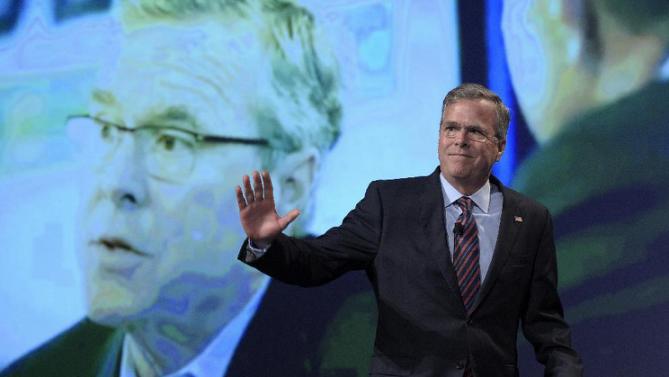
Leading Republican presidential prospects faced off at an event Tuesday in battleground Florida, a state that could prove pivotal to the Florida heavyweights seeking the nomination, not to mention any rival who manages to win here instead. Jeb Bush, a former two-term Florida governor, and Florida’s junior Sen. Marco Rubio, were the home-state stars at a GOP economic gathering that drew a half dozen White House hopefuls to a Disney World convention center – Rubio, tied up by Senate business, appeared by video. They are so heavily favored in the March 15 primary next year that some rivals are considering bypassing Florida’s race. But they showed up Tuesday. Rubio offered the audience an indirect but unmistakable barb at Bush, who spoke later. “While our economy is transforming, our policies and our leaders are not,” Rubio said. “Our outdated leaders continue to cling to outdated ideas.” The 44-year-old Republican did not name Bush or Democrat Hillary Rodham Clinton. But the implication was clear in a 2016 campaign that contrasts a group of younger political leaders and the two older figures whose families have dominated national politics for decades. “It’s kind of hard to imagine that my good friend, Marco, would be critical of his good friend, Jeb,” a sarcastic Bush said with a smile after acknowledging to reporters there would be “elbows and knees” thrown in the race. “This isn’t Tiddlywinks we’re playing.” He continued: “If I’m a candidate, I want to be the guy to beat.” Tuesday’s speaking program also featured former Arkansas Gov. Mike Huckabee, former Texas Gov. Rick Perry, Wisconsin Gov. Scott Walker, New Jersey Gov. Chris Christie and Louisiana Gov. Bobby Jindal. Despite their appearance, many campaigns are weighing whether to spend time and money in the state Bush and Rubio call home. Other than the Florida pair, none who showed up Tuesday has begun to establish teams of operatives and activists on the ground in Florida. Many are already working to temper expectations, while realizing they cannot ignore Florida altogether – both for its abundance of wealthy donors and its status as a must-win swing state in the general election. Wisconsin Gov. Scott Walker tried to walk back recent comments he might avoid the Florida primary should he run for president. Bush and Rubio “certainly would have a competitive advantage,” he said. “But if I didn’t think I could compete, I wouldn’t be here today.” He ticked off a list of personal and political connections to Florida. Florida could be decisive in the Republican race. The Florida Legislature recently moved the state’s primary to March 15, the earliest date the Republican National Committee allows for states that award all of their delegates to the primary winner. States voting before then must award their delegates proportionately. The shift was seen as a move to help Bush or Rubio, one of whom would claim the state’s trove of delegates by winning Florida. Even so, with other states voting first, nearly half of the delegates needed to clinch the nomination will have already been awarded by the time Florida voters weigh in. That makes Florida particularly important for Bush or Rubio. Other contenders, Perry and Huckabee among them, are shaping a strategy focused on early-voting states such as Iowa and South Carolina, hoping to build momentum that could translate down the line in Florida. Bush and Rubio are by no means guaranteed a Florida victory. They face strong competition in the earlier states. And Brian Ballard, who led Florida fundraising for John McCain and Mitt Romney, said “a lot of guys are in striking distance” of Rubio and Bush even in Florida. The demands of competing in Florida will require tough choices by the larger field. It costs about $1.5 million a week to run statewide television ads, far more than in New Hampshire, Iowa and South Carolina. “Florida’s an expensive state, it’s a winner-take-all state, and how much of your resources you dedicate to it is a nightmare decision for the operatives and those who advise the candidates,” said former Florida GOP chairman Al Cardenas, now a Bush supporter. Yet, as Tuesday’s event showed, top-tier candidates will not ignore Florida altogether in the coming months. Huckabee reminded Florida voters that Bush and Rubio aren’t the only Florida residents in the race. The former Arkansas governor now lives in the Panhandle, and referred to himself as “someone who is like a lot of other people in America – now a Floridian.” He also heaped praised on Gov. Rick Scott‘s economic leadership, acknowledging an ulterior motive: “Anything I could do to suck up to him and his donors by God I’m going to do,” Huckabee said with a smile. Republished with permission of the Associated Press.
Who is in, and about to get in, the GOP race for President
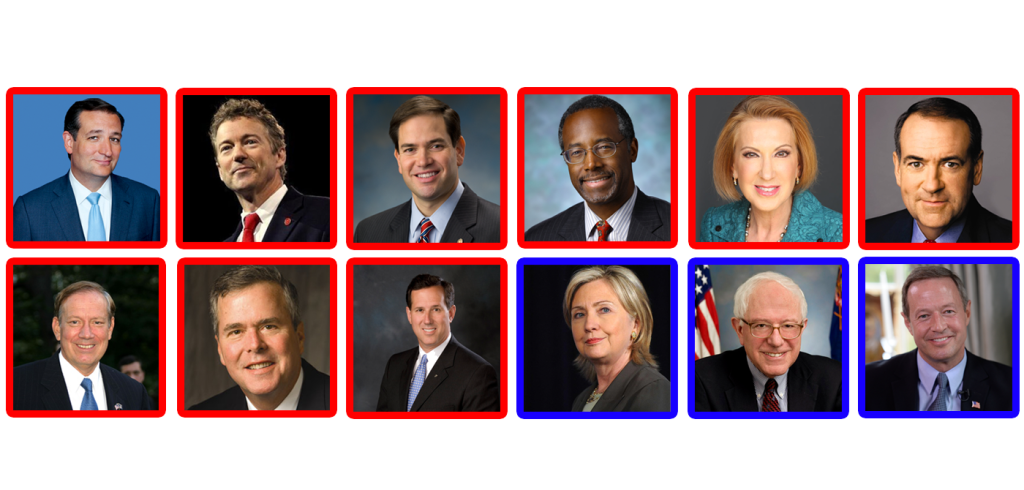
South Carolina Sen. Lindsey Graham is the ninth major Republican to enter the party’s 2016 presidential primary contest. Another half dozen or so are likely to get into the race later this summer, including former Texas Gov. Rick Perry later this week. Here’s a look at the GOP field: Who’s in, who’s almost in, and who’s still waiting for the right moment. IN THE RACE: Ted Cruz The first major Republican to get into the race, the Texas senator began his campaign March 23 at Liberty University in Lynchburg, Va. “I believe in you. I believe in the power of millions of courageous conservatives rising up to re-ignite the promise of America,” he said. Rand Paul The Kentucky senator launched his campaign April 7 in Louisville, where he told a hotel ballroom full of supporters, “I have a message, a message that is loud and clear and does not mince words: We have come to take our country back.” Marco Rubio In a speech April 13 in Miami, the senator from Florida called his candidacy for president a way for the country to break free of ideas “stuck in the 20th century.” He said, “This election is not just about what laws we are going to pass. It is a generational choice about what kind of country we will be.” Carly Fiorina The former tech executive chose social media and a nationally broadcast morning TV network show to launch her campaign on May 4, and she quickly went after Democratic front-runner Hillary Rodham Clinton. “I have a lot of admiration for Hillary Clinton, but she clearly is not trustworthy,” she said. Ben Carson The retired pediatric neurosurgeon got into the race the same day as Fiorina with an announcement speech in his native Detroit. “It’s time for people to rise up and take the government back. The political class won’t like me saying things like that. The political class comes from both parties.” Mike Huckabee The former Arkansas governor and runner-up in the 2008 GOP presidential primaries kicked off his second White House campaign May 5 in the hometown he shares with former President Bill Clinton — Hope, Ark. “Power, money and political influence have left a lot of Americans behind,” he said. Rick Santorum The runner-up to Mitt Romney in 2012, Santorum began his return engagement to presidential politics May 27 in his western Pennsylvania hometown of Cabot. “The last race, we changed the debate. This race, with your help and God’s grace, we can change this nation,” he said. George Pataki A former three-term governor of New York, who previously considered presidential campaigns in 2008 and 2012, Pataki got his campaign started on May 28 in Exeter, N.H. “While I saw the horrors of Sept. 11 first hand, in the days, weeks and months that followed, I also saw the strength of America on display. … I completely reject the idea that we can only come together in adversity.” Lindsay Graham After all but confirming the week before that he was in, the senior senator from South Carolina made it official Monday with a speech in his hometown of Central, S.C., that cast the foreign threats to America in dark terms. “Simply put, radical Islam is running wild. They have more safe havens, more money, more weapons and more capability to strike our homeland than any time since 9/11. They are large, they are rich, and they’re entrenched.” ALMOST THERE: Bobby Jindal The governor of Louisiana took his latest step toward running for president on May 18, announcing a campaign exploratory committee. “Economic collapse is much closer to the door than people realize, our culture is decaying at a rapid rate and our standing in a dangerous world is at an all-time low.” Rick Perry The former Texas governor is expected to announce his 2016 presidential bid on Thursday at an airfield outside Dallas, surrounded by prominent veterans — including the widow of Chris Kyle of “American Sniper” fame. WAITING FOR THEIR MOMENT: Jeb Bush The former Florida governor created a political action committee and super PAC in December and has been raising many millions for the groups expected to support his likely candidacy. Bush has begun visiting early-voting states, has a foreign policy trip to Europe planned for June and is expected to announce his plans shortly after returning. Chris Christie He says he hasn’t decided whether he’s running yet, but the New Jersey governor looks an awful lot like a candidate, making frequent trips to early-voting states, delivering a series of policy speeches and raising money for a political action committee and super PAC created by his backers. John Kasich The former congressman and current Ohio governor is hinting to donors and voters he’s likely to get into the race. His political organization, New Day for America, announced Monday his plans to travel to Iowa later this month. Donald Trump The real estate mogul and reality television star has launched a presidential exploratory committee and is still debating on whether to get into the race. Never short of self-confidence, he said last month he’d be a force to reckon with in the GOP debates. “Selfishly, the networks would put me on because I get great ratings,” Trump said. Scott Walker The Wisconsin governor says he will announce his decision after signing the state budget, which is expected to pass the Republican-controlled state Legislature in late June. Walker has already created a nonprofit group, Our American Revival, to help promote his expected candidacy, and a super PAC led by his close advisers is also up and running. Republished with permission of The Associated Press.
Presidential primary brief: 526 days until Election Day

Welcome to a new Monday presidential primary brief provided by Alabama Today. Every week you can find your latest headlines on the presidential primary races as we count down the days until Election Day. 273 days until AL Presidential Primary 526 days until Election Day Convention Dates: Republican July 18-21 2016, Democratic July 25-28 2016 Weekly Headlines: Lincoln Chafee to announce presidential run on June 3 Rick Santorum runs for White House again George Pataki announces 2016 presidential bid For more polling data visit RealClearPolitics. Press Clips: Pro-‐Rand Paul group gets ready to rumble with anti-‐NSA ad (Politico 5/29/15) A super PAC supporting Sen. Rand Paul (R-‐Ky.) for president has released an ad that treats Sunday’s legislative battle over the Patriot Act more like a monster-‐truck rally or a Wrestle-mania tournament. “Get ready America,” the voiceover in the video says as a bald eagle breathes Gire, a bomb explodes and lightning strikes, “for the biggest brawl for liberty of the century.” Nate Silver: What to watch for in 2016 election (Detroit Free Press 5/29/15) Here are several lessons for the 2016 presidential elections from prognosticator Nate Silver, founder of the phenomenally accurate FiveThirtyEight.com. He spoke Thursday at the Mackinac Policy Conference. The nomination of Democrat Hillary Clinton is inevitable, but the general election will be a toss-‐up. Democrats have a weak bench and Republicans have a Give-‐ring circus of overlapping candidates between moderate, establishment, Christian conservative, tea party and Libertarian. “It’s a real tight for space.” New Jersey Gov. Chris Christie is definitely in trouble and former Florida Gov. Jeb Bush is possibly in trouble. “Its very difficult to win the primary when most of the voters don’t like you,” Silver said of Christie. Ben Carson wins Southern Republican straw poll ahead of 2016 presidential election (Christian Today 5/29/15) Doctor-‐turned-‐politician Ben Carson easily won the Southern Republican Leadership Conference straw poll held in Oklahoma on Saturday in the first major survey on the popularity of at least 17 declared or prospective candidates for the Republican Party’s nomination for the November 2016 election. Carson, a popular social conservative who is a Gierce opponent of Obamacare, won 25.4 percent of the vote. Also getting considerable shares of the vote were Wisconsin Gov. Scott Walker and Texas Sen. Ted Cruz who received 20.5 percent and 16.6 percent of the vote, respectively. Sanders wants to debate Republicans (Politico 5/31/15) Bernie Sanders on Sunday called for a more robust debate schedule beginning this summer. The Vermont senator, challenging front-‐runner Hillary Clinton for the Democratic nomination, also proposed on NBC’s “Meet the Press” some debates with Republican White House hopefuls. “We need a lot more debates in this campaign,” Sanders said. “I hope very much that we can begin with the Democratic candidate debates as early as July and have some Republicans in those debates as well.” Ohio Gov. Kasich looks to announce 2016 presidential bid this summer (WaPo 5/27/15) Ohio Gov. John Kasich, who has been actively gauging reactions to a possible campaign for president in 2016, is now moving rapidly to assemble the staff and financial resources for such a bid and is looking to declare his candidacy sometime after June 30, according to knowledgeable Republicans. The two-‐term governor and former House member is running through a checklist before formally entering the race, but strategists close to Kasich and other longtime friends say there is no doubt that he will soon join the crowded Gield of those vying for the GOP nomination. Marco Rubio won’t compete in Iowa Straw Poll (Politico 5/30/15) Sen. Marco Rubio will not participate in the Iowa Straw Poll, his campaign team confirmed Saturday. The Florida senator and 2016 hopeful’s decision marks the latest blow to the August event long considered a staple on the Republican road to the presidential nomination. Jeb Bush, Sen. Lindsey Graham and Mike Huckabee have all said they won’t participate this cycle. Many, including Gov. Scott Walker and Sens. Rand Paul and Ted Cruz have yet to signal whether they will attend. What impact will frustrated veterans have on 2016 election? (Haaretz 5/25/15) Memorial Day in America moves me to predict that one of the stories to watch is the growing bitterness of the veterans of Iraq and Afghanistan. The Associated Press had a piece of this story over the weekend, when it reported that GIs or ex-‐GIs who fought in Iraq “have been watching in frustration” as “Republican presidential contenders distance themselves from the decision their party enthusiastically supported to invade that country.” O’Malley’s long-‐shot bid gets complicated start (Politico 5/30/15) Martin O’Malley’s presidential bid has always been a long-‐shot, but the odds looked even longer Saturday as he officially kicked off his campaign from Federal Hill Park. The run-‐up to his launch here could hardly have been worse, complicated in recent weeks by unrest in the city where he served as mayor and the unexpected early momentum of another Hillary Clinton challenger: Bernie Sanders. At one time, O’Malley figured to be Clinton’s default rival for the Democratic nomination. He won two terms as governor of Maryland, winning by wide margins, and honed his national fundraising chops as chairman of the Democratic Governors Association. Bernie Sanders facing ‘uphill battle’ in Iowa (USA Today 5/29/15) Sen. Bernie Sanders, (I-VT), began his first visit to Iowa since announcing his run in the Democratic presidential primary with a standing-‐room-‐only crowd in the eastern city of Davenport. The Thursday night turnout was more than even the organizers expected. Kevin Perkins, a Davenport resident and planner of the event, said that the auditorium at St. Ambrose University had been set up to seat 300 people. As people poured in, Perkins and other organizers opened up an adjacent room. Perkins estimated that 750 people showed up in total.
Starting his 2016 campaign, Lindsey Graham is blunt on Middle East
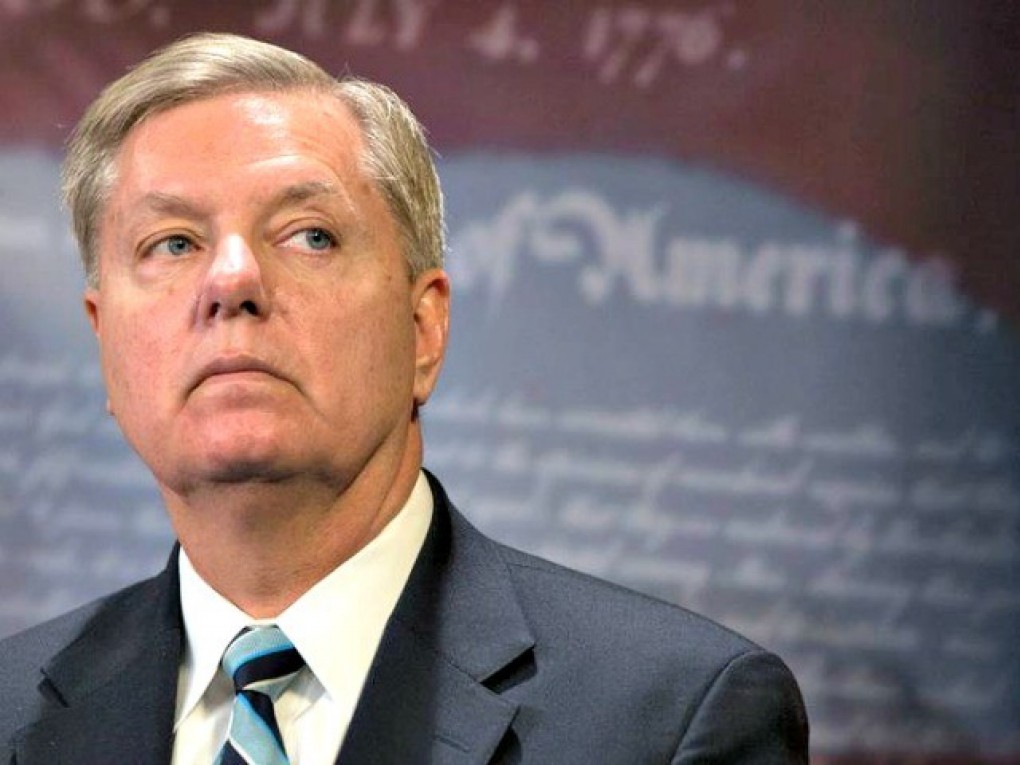
Lindsey Graham will formally launch his bid for president in the small South Carolina town where he grew up. His White House ambitions are rooted half a world away in the Middle East. When kicking off his campaign Monday, South Carolina’s senior senator is sure to blast President Barack Obama‘s withdrawal of troops from Iraq, insist on the need to strong-arm Iran over its nuclear program and work to subdue the violent Islamic State militants who have gained footholds in Iraq and Syria. Yet in the early days of the 2016 campaign for president, Graham has already gone further than most of his rivals for the GOP nomination in saying how he would tackle such problems, while acknowledging the potential costs of his strategy. Graham wants to put an additional 10,000-plus U.S. troops into Iraq, adding to the several thousand there now working as trainers and advisers only. He says it could take even more troops to stabilize the Middle East over time, adding “more American soldiers will die in Iraq and eventually in Syria to protect our homeland.” The Islamic State militants, Graham argued at a recent campaign stop, “want to purify their religion and they want to destroy ours and blow up Israel. Every day they get stronger over there, the more likely we are to get hit over here.” He added, “I don’t know how to defend this nation, ladies and gentlemen, with all of us sitting here at home.” It’s a calculated risk for the 59-year-old three-term senator and retired Air Force lawyer who surprised many when he began to hint earlier this year he would run for president. A February poll conducted by the Pew Research Center found 63 percent of adults backed some kind of military campaign against the Islamic State group, compared to 30 percent who disapprove. When asked about using ground troops, support dropped to 47 percent – with 49 percent opposed. Further, the same survey found Americans almost evenly divided on whether military force is “the best way to defeat terrorism” or whether it “creates hatred that leads to more terrorism.” Graham’s hawkish approach stands in stark contrast to his fellow U.S. senator and presidential candidate, Kentucky’s Rand Paul, who favors less military intervention abroad. It’s also notable for its specifics, especially his warning that U.S. troops are likely to perish in the Middle East as part of his approach. While New Jersey Gov. Chris Christie said in a recent speech in Georgia that “we should work with our allies that want to stand against ISIS,” he’s described that role as helping with the “weapons, equipment and training” needed for a “long fight.” Wisconsin Gov. Scott Walker says he’d “take the fight to them before they take the fight to us,” but he has yet to detail what that entails. Florida Sen. Marco Rubio, writing over the weekend in The Washington Post, said the U.S. should increase the number of American troops in Iraq, but unlike Graham, didn’t say how many ought to deploy. While Graham barely registers now in national polls that will be used to determine which candidates are invited to the GOP’s presidential primary debates beginning this summer, he argues Republican voters will reward him for his blunt talk about future American casualties. “Look, I know from polling that (national security) is the No. 1 issue in Iowa and New Hampshire” among likely GOP voters, he said. “And I’ve been more right than wrong,” he adds, noting that he was an early supporter of the troop “surge” in Iraq under President George W. Bush and was always critical of Obama’s effort to reduce the U.S. presence in Iraq. Graham hammers Obama for not playing a more active role in establishing a functioning, democratic government in Libya after revolutionaries toppled Moammar Gadhafi in 2011. And he insists that Obama’s work to reach a nuclear accord with Iran is in vain, because the Iranians are “liars” who won’t stick to whatever inspections and restrictions make up an eventual deal. “To the Iranians: You want a piece of a nuclear power program, you can have it,” Graham says as part of his standard campaign speech. “If you want a bomb, you’re not going to get it. If you want a war, you’re going to lose it.” After a pause, he adds, “There’s no other way to talk in the Mideast.” Republished with permission of The Associated Press.
Marco Rubio latest GOP hopeful to bow out of Iowa Straw Poll
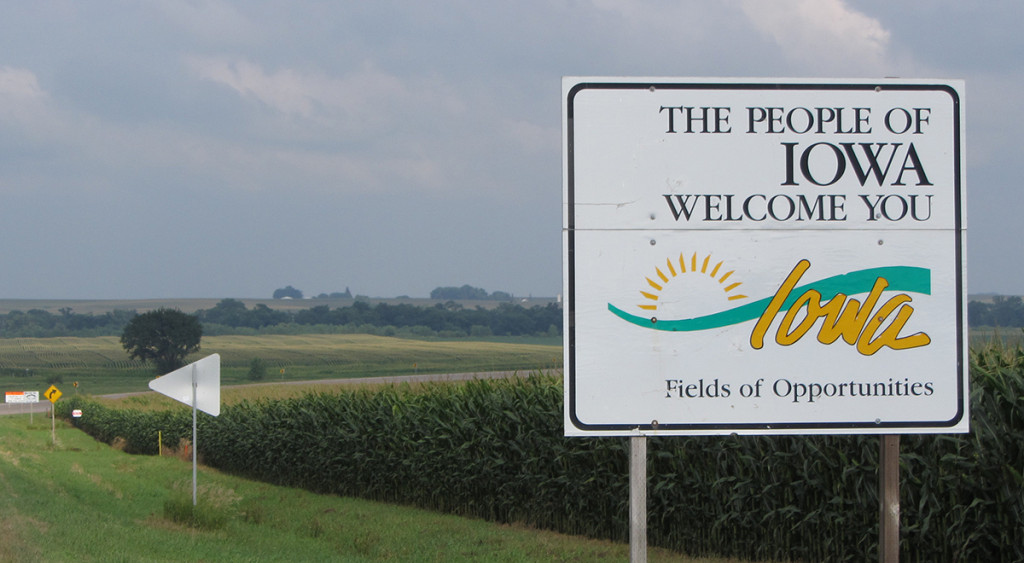
Sen. Marco Rubio will not be taking part in this year’s Iowa Straw Poll. The Florida Senator and announced Republican presidential candidate is joining Jeb Bush, Sen. Lindsey Graham and Mike Huckabee in bowing out of the once-prominent presidential campaign event. POLITICO reports that Rubio’s decision, confirmed by his campaign on Saturday, is just the latest blow to the event which had been a mainstay for the Republican presidential nomination process. Several other candidates, such as Gov. Scott Walker, Sens. Rand Paul and Ted Cruz, have not yet indicated whether they will take part in the poll, which is in early August. Alluding to the need to run a “lean campaign,” Alex Conant, Rubio’s communications director, told POLITICO they “will only spend money on contests that award delegates.” Bush also cited the “large financial costs” when he told reporters his campaign “doesn’t do straw polls.” In the latest Bloomberg Politics/Des Moines Register poll published on Saturday, about 17 percent of likely Republican caucus-goers favor Walker, with Paul and Ben Carson next at 10 percent each. Bush and Huckabee follow at 9 percent. Next are Rubio and Rick Santorum with 6 percent each. Both eventual GOP presidential nominees John McCain in 2008 and Mitt Romney in 2012 passed on the straw poll. The Iowa poll is two days after the first GOP debate in Cleveland and overlaps with the Atlanta RedState Gathering set for Aug. 6 to 9.


